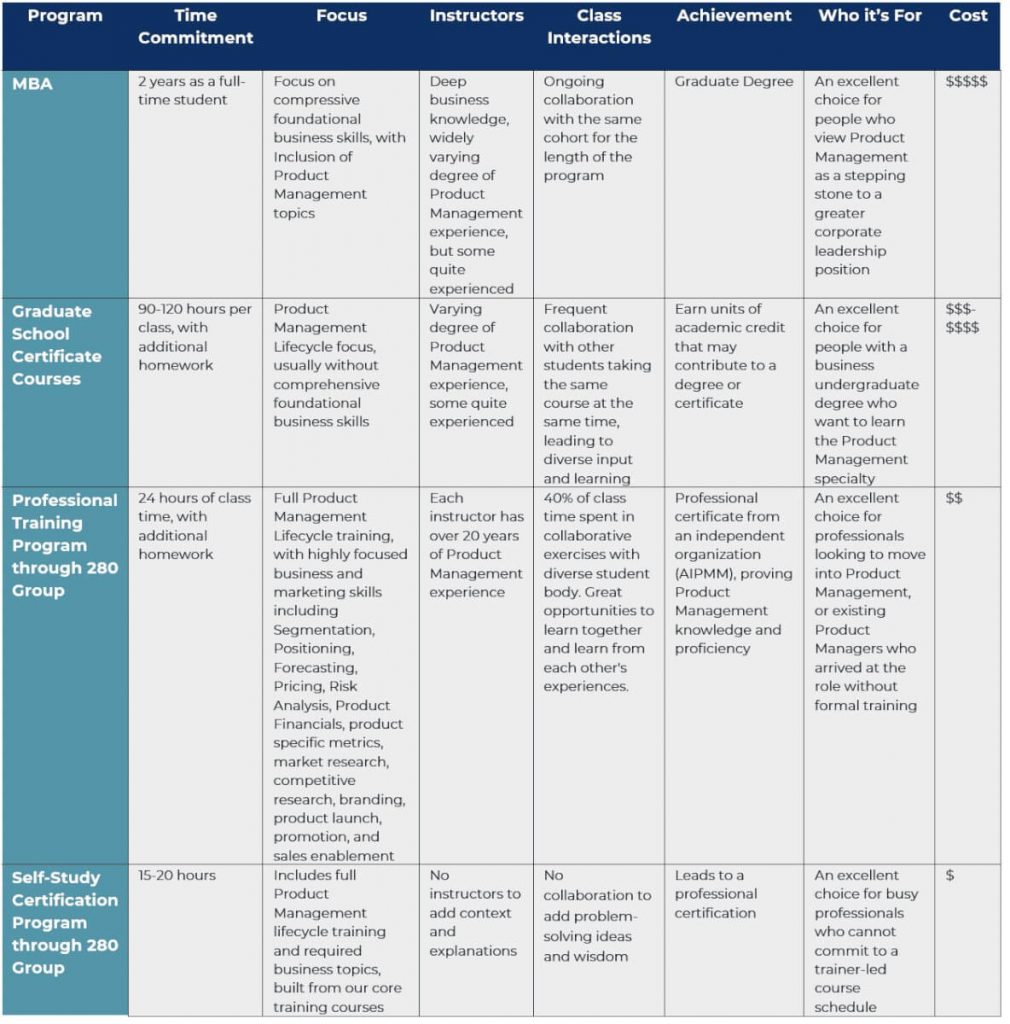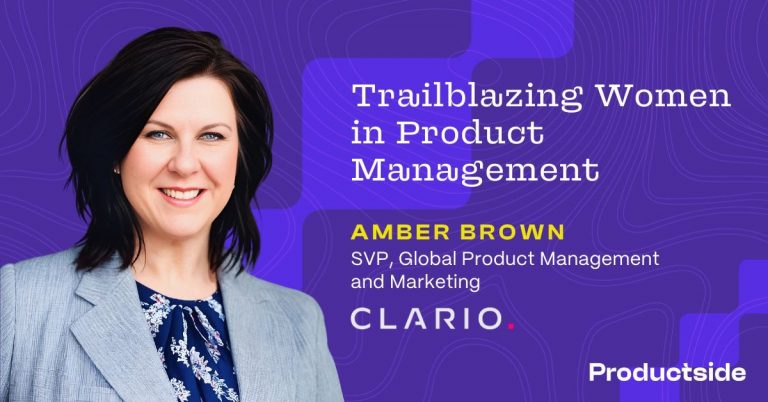
Whether you have started your career in another field and making the shift into Product Management, or if you are nearing the completion of your undergraduate degree and have discovered your passion for Product Management, you may be considering obtaining an MBA in order to master the critical business expertise required for this role. But which program should you choose? Sifting through the options can be a daunting task.
While all MBA programs provide business fundamentals, there are a few programs that offer specialized content in Product Management. Below is a list of our favorite MBA programs for Product Managers.
Best MBA Programs for Product Managers
#1: NYU, Stern School of Business

Their full-time MBA program offers a specialization in Product Management, with courses from Data-Driven Decision Making to Innovation and Design. What I love about this program is that you can easily blend courses from 26 different specializations, such as FinTech or Management of Technology and Operations, to focus your Product Management MBA further.
#2: Carnegie Mellon University, Tepper School of Business
With a Technology Strategy and Product Management track that emphasizes development, application, and management of cutting-edge technologies, this program serves as a foundation for a hardware and software industry Product Management role. What I love about this program is the dual focus on strategic analytics and leadership development, both important foundations for the Product Manager role.
#3: MIT, Sloan School of Business

With two tracks available for product: one for Entrepreneurship & Innovation, and one for Enterprise Management, you will gain valuable insights into product management from different aspects of firm size. What I love about this program is the availability of a dual-track to earn an MBA alongside a Master of Science degree with their Leaders for Global Operations program. This program leverages a six-month internship with a partner organization to equip students with experience in management, engineering, and leadership.
#4: UC Berkeley, Haas School of Business
With several applied innovation electives available, including Product Management, Product Design, and Lean Launchpad, coupled with a core curriculum focused on data-driven decisions and leadership, this program has all the basic elements needed for a successful Product Management career. What I love about this program is the combination of experiential learning from the applied innovation courses coupled with the traditional academic courses.
#5: UCLA, Anderson School of Management
With a specialization in Technology Leadership available, which includes courses such as New Product Development, Technology Management, and Innovation, this program brings an in-depth technology expertise to the foundational curriculum. What I love about this program is the dedication to global viewpoints sustained throughout the curriculum.
#6: Northwestern University, Kellogg School of Management
Their Technology Management pathway includes a huge breadth of courses in Product Management, Product Marketing Management, and Business Operations/Strategy. What I love about this program is the cross-disciplinary approach to teaching, recognizing that organizational problem-solving does not happen in siloed functional areas. This fits perfectly with the role of the Product Manager as we must constantly work across functional areas in our role.
#7: UT Austin, McCombs School of Business

Their one-year immersion program focused on the intersection of business, technology, and innovation is not truly an MBA; it is an MS in Technology Commercialization. However, its tight focus on product entrepreneurship deserves a place in this list. What I love about this program is that it is offered with a flexible schedule for working adults and specifically addresses how to take new technologies and turn them into practical products.
Is an MBA necessary to become a Product Manager?
Pursuing an MBA is an enormous undertaking in money, time, and personal focus. It may not be the right decision for everyone. So, is an MBA necessary to be a great Product Manager? And, if not, what should I do to fill a possible knowledge gap?
The answer is: no. Don’t misunderstand me, I have an MBA and it has served me well as a Product Manager. It’s great for professional credibility and can open doors for you. But, is it required in order to land a Product Management role and do extremely well at it? No, it is not. Acquiring a degree requires that you work across a tremendous breadth and depth of topics, many of which aren’t as pertinent to the Product Management role.
Important factors to consider:
Professors with PM experience
While more and more professors have experience outside of academia, how many have actual Product Management experience, or know how to make theoretical material relevant to this field? In my experience, not very many, but this will vary in each program.
Time in a real work environment
A major aspect of being a great Product Manager is your ability to make difficult decisions under pressure and navigate complex and politically rife networks. Experience is your best teacher to hone and prove your skills here, and two years in school are two years lost mastering these important leadership skills in a real work environment.
ROI and job salary
According to this LinkedIn data, the salaries of Product Managers with and without an MBA are nearly on par. Which certainly makes you think twice about the ROI of such a significant investment.
MBA Alternatives

So, what are the alternatives to an MBA? In order to answer this, you must begin with an assessment of your skills gap. Do you lack skills in product lifecycle management? Product development processes? Marketing? Finance? Research? Leadership? Building strategy? Take this free Product Management Skills Assessment to generate a personal report on your strengths and weaknesses.
Next, begin with a fundamentals course such as 280 Group’s Optimal Product Management and Product Marketing, which covers the entire product lifecycle and teaches the Product Manager’s role and responsibilities. This course is often called “a mini MBA” for good reason—highly experienced Product Managers have cherry-picked the best concepts from an MBA and condensed them into a packed curriculum framed completely around the product lifecycle. It is then delivered by experienced instructors who will help you understand how to apply it.
This course will give you deep insight into your own strengths and weaknesses as a Product Manager, allowing you to create a targeted growth plan. Perhaps a 1-year program will give you the ROI you are looking for. Or a Product Manager graduate certificate program, or simply a few key graduate courses to button up your weak spots. Many people find there is enough information from this one foundational course to fast-track you into a Product Manager role immediately. And the Certified Product Manager™ Credential from this course is great for building professional credibility in a crowded field. After speaking to many hiring managers over the years, we found that they see candidates who take training and earn certifications demonstrate an important desire to go beyond just on-the-job work experience to improve their skills.
Which Product Management Educational Program is Best for Me?
We’ve put together the table below to further help you consider your options. Whatever your decision, there are a lot of options for growing your skills, building your network, and becoming an awesome Product Manager. Your next step is to choose one and get started on your path!

Choose Your Path
Whether choosing an MBA program or an MBA alternative, stepping into Product Management is meaningful work. Leverage your options to continue growing your skills so you can be highly effective. The path you choose must be right for you and your personal career goals. Be sure you get the tools and learning you need to enable you to build better products and further advance your career. And if you need advice, we’re here for you.


